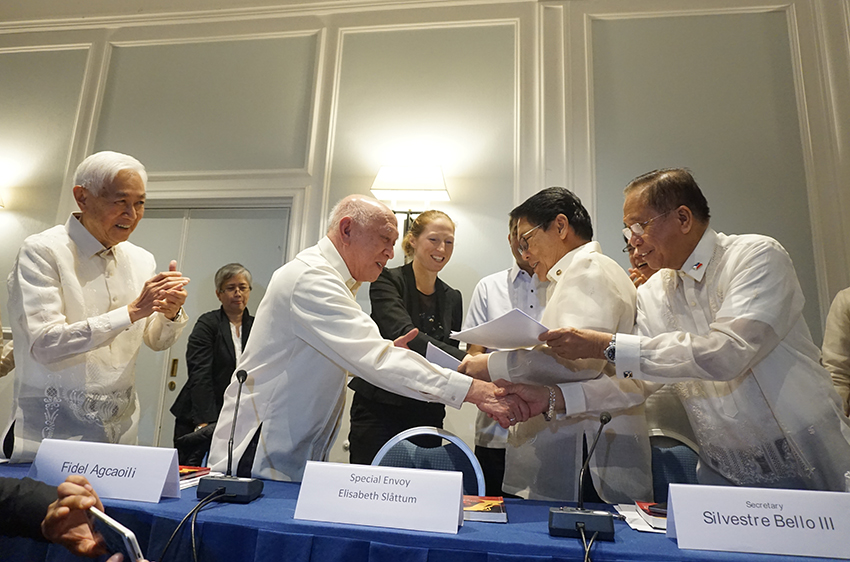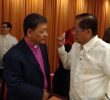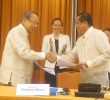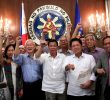
Peace panels from the Philippine government and the National Democratic Front of the Philippines conclude the third round of the formal talks in Rome, Italy on Wednesday, Jan. 25, 2017. (Zea Io Ming C. Capistrano/davaotoday.com)
ROME, Italy— After a week of negotiations, the Philippine government and the National Democratic Front of the Philippines concluded the third round of talks here on Wednesday night, Jan. 25.
The original schedule was moved from 3:00 pm (10:00 pm Philippine time) to 5:00 pm, but the ceremony did not start until 6:00 pm.
Despite the delay of the start of the closing ceremony, it was still good news as the Parties declared the talks as “successful.”
Among the gains of the talks were the signing of the supplemental guidelines on the Joint Monitoring Committee and the ground rules for the meetings of the reciprocal working committees on social and economic reforms.
These documents were seen to aid the acceleration of the negotiations and the operationalization of the CARHRIHL or the Comprehensive Agreement on Respect for Human Rights and the International Humanitarian Law, the first major agreement signed by both Parties in 1998.
Strict compliance of CARHRIHL
Both parties agreed to strictly comply with the CARHRIHL, the first of the four substantive agenda of the GRP-NDFP peace negotiations.
The supplemental guidelines of the JMC, the body tasked to monitor the implementation of CARHRIHL, was described by GRP chief negotiator Silvestre Bello III as “an initial dividend” of the third round of talks. Under the supplemental guidelines, the JMC may conduct joint investigation of a complaint.
Meanwhile, the NDFP raised various issues which they see as violations to CARHRIHL including the: non-observance of the Hernandez political offense doctrine which prohibits the filing of criminal cases against persons who are pursuing a political belief, the burial of the late dictator President Ferdinand Marcos Sr at the Libingan ng mga Bayani, the incidents of military’s use of schools, barangay halls, and other civilian structures in communities, and the issue of due process related to the anti-drug war of the government.
The GRP assured its adherence to CARHRIHL and said that should there be violations, the panel will study the reports and take appropriate action.
But concerning the reports of military’s occupation of civilian structures, the GRP said the AFP troops were in the communities “upon the invitation of local government units, escorting civilian agencies in delivering services.”
The GRP panel also explained that Marcos’ burial was not intended for his “political rehabilitation.”
Prisoners’ release
The NDFP also reiterated that the release of political prisoners is an issue of compliance to CARHRIHL.
During his opening statement, NDFP peace panel chairperson Fidel Agcaoili put emphasis on the non-release of 392 prisoners, among whom are three NDFP consultants who were expected to join the peace talks last year.
“Their continuing imprisonment is a violation of the JASIG (Joint Agreement on Safety and Immunity Guarantees),” he said.
Meanwhile, the GRP assured the NDFP of the release of the three consultants namely: Eduardo Sarmiento, Emeterio Antalan and Leopoldo Caloza through presidential clemency and other legal modes.
The government committed to expeditiously process the release of political prisoners starting with 200 qualified political prisoners.
The GRP will file manifestation in support of the motion for the temporary liberty of the NDFP consultants and staff who were released in August last year to be extended for the duration of the peace negotiations.
In his closing statement, Bello said despite the contentious issues, the Parties explored “new ways and other platforms to advance the talks.”
To accelerate the negotiations on social and economic reforms, the parties signed the ground rules for the conduct of the meetings of the reciprocal working committees on SER.
The rules included the formation of bilateral teams who may help in reconciling contentious issues on the different drafts of the GRP and NDFP on the Comprehensive Agreement on Social and Economic Reforms, deemed the “heart and soul” of the peace process.
The teams may meet in between the regularly scheduled formal meetings in the Philippines or any neighboring country.
Both parties have already exchanged their complete drafts on CASER “more or less 10 days” before the opening of the talks in Rome.
According to the Joint Statement, the RWCs on SER have tackled the first four parts comprising the CASER draft.
For the first part, the RWCs on SER reaffirmed their April 2004 agreement on the Preamble and the Declaration of Principles. However, unresolved provisions and new insertions from the NDFP will be submitted to the negotiating panels for resolutions.
The RWCs discussed on the Bases, Scope, Applicability (Part 2) and they have identified points of agreement, while the Part 3 entitled Desired Outcomes was made.
The RWCs have started discussing Agrarian Reform and Rural Development (Part 4).
The committees agreed “in principle,” to the free distribution of land to farmers and farm workers as part of the governing frameworks of CASER.
Randall Echanis, NDFP RWC-SER spokesperson said they are expecting to finish the draft within this year. While, Hernani Braganza, supervising panel member from the government said they are hoping to finish the draft within six months.
Braganza said the negotiations on CASER started 15 years ago, but it is only now that both Parties have agreed to have a common framework.
“Because of this the negotiations will be faster,” he said.
Federal Republic of the Philippines
The parties exchanged full drafts of the tentative Agreement on Political and Constitutional Reforms.
The parties have exchanged views on the proposed federal form of government.
In his closing statement read by NDFP senior adviser Luis Jalandoni, NDFP chief political consultant Jose Maria Sison is optimistic that the Parties can be ready for the founding of the Federal Republic of the Philippines.
“When the fourth round of talks comes, the goal of finishing the unified drafts of the CASER and CAPCR shall be in sight,” he said.
Sison said they are hoping that before the year ends the comprehensive agreements will be ready for approval.
Meeting on February
The parties will meet again in Utrecht, The Netherlands some time in February to discuss the proposed bilateral ceasefire of the government and other issues concerning the compliance to CARHRIHL.
The meeting will coincide with the depositing of the documents of identification for JASIG-protected NDFP members.
The fourth round of talks will take place on April 2 to 6 in Oslo, Norway. (davaotoday.com)









